Big Clinton donor Tom Steyer calls for more Democratic debates
By the numbers
Welcome to Trail Guide, your daily host through the wilds of the 2016 presidential campaign. It's Friday, Sept. 25, and this is what we're watching:
- Things get more awkward for the Democratic Party and Hillary Rodham Clinton as Tom Steyer wades into the debate over debates
- Social conservatives gathered in Washington for the annual Value Voters Summit were delighted by House Speaker John Boehner's resignation
- Are A-list California donors withholding their support for Clinton ? The Times' Evan Halper and Melanie Mason check the temperature of her moneyed backers
'It's not just anger out there. It is a seething rage.'
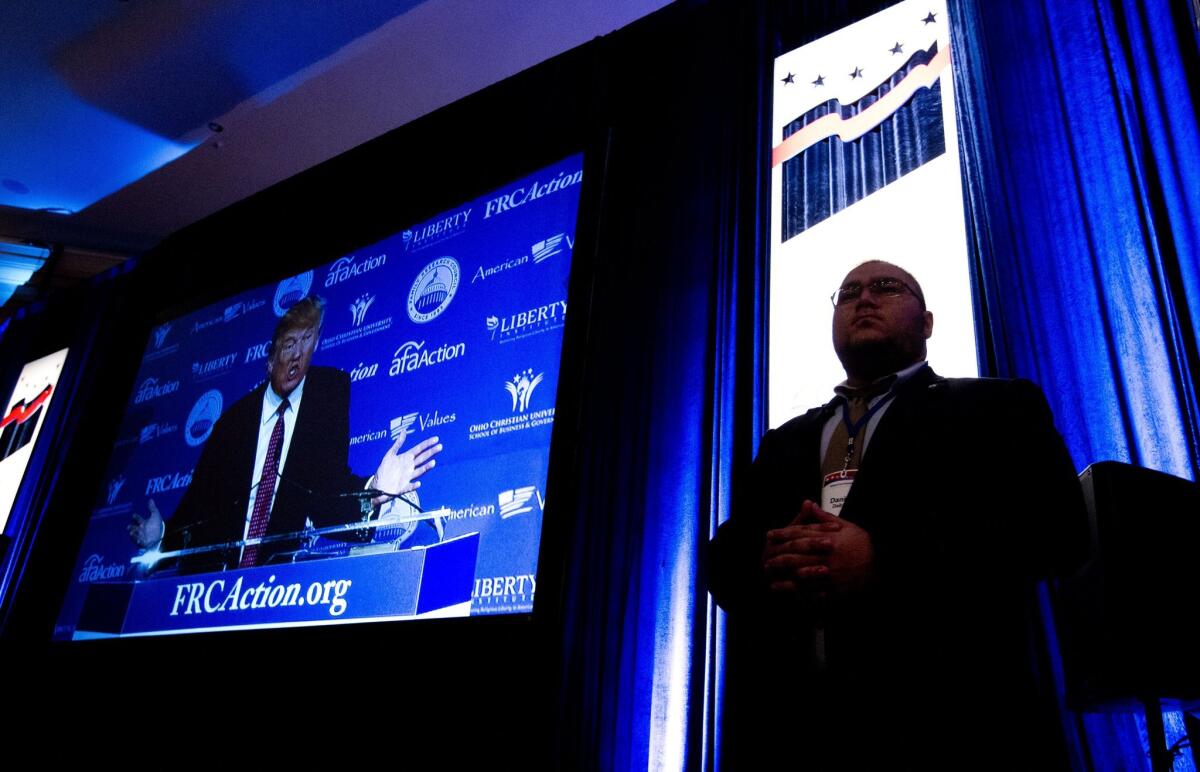
Republican presidential candidate, businessman Donald Trump, speaks during the Values Voter Summit, held by the Family Research Council Action, Friday, Sept. 25, 2015, in Washington. ( AP Photo/Jose Luis Magana)
Simmering anger dominated an annual conference in Washington for social conservatives on Friday, with both White House hopefuls and activists expressing displeasure with government leaders.
The news of Speaker John A. Boehner's resignation brought passionate applause from attendees at the gathering, the Values Voters Summit, and it provided a convenient gateway for the presidential candidates to offer themselves as the outsiders Washington needs.
"Yesterday, John Boehner was speaker of the House," said Sen. Ted Cruz of Texas. "Y'all come to town, and somehow that changes. My own request is: Can you come more often?"
For candidates including Sen. Marco Rubio of Florida, Dr. Ben Carson and former Texas Gov. Rick Perry, speeches at the conference, primarily sponsored by the Family Research Council, tapped into the frustration that many said they felt over recent events, including President Obama's landmark Iran nuclear deal, continued federal funding of Planned Parenthood following the release of controversial videos and Hillary Rodham Clinton's newly declared opposition to the Keystone oil pipeline.
"I'm out on the campaign trail every day and I understand people are angry, " said former Arkansas Gov. Mike Huckabee. "In fact, I tell people it's not just anger out there. That's not the mood. It is a seething rage."
Bev Marinelli of Lumberton, N.J., who came to the conference with her grandson, called Boehner a big disappointment and compared him to front-runner Trump, whom she backs.
"He never had the Trumpness to stand up to Obama and the administration," she said.
The Rev. Seth Britton, pastor at Red Hill Lutheran Church in Tustin, said he thought Boehner's resignation might bring some change to politics within the GOP.
"Maybe this will be the initiative that will lead Republicans to a consensus on some issues," he said.
How much did this GOP super PAC like John Boehner? Enough to quote Joni Mitchell
The reaction on the presidential campaign trail to John Boehner's resignation put in stark relief the deep divisions in the Republican party going into the 2016 election.
On the one had, there were the social conservatives gathered at the Values Voters Summit in Washington. They cheered wildly when told Boehner, the House speaker from Ohio, was stepping down. The insurgents they support had claimed a scalp. It was a good day for them.
On the other hand, there was the reaction over at the offices of American Crossroads, the heavyweight super PAC founded by GOP establishment standard-bearer Karl Rove. The president of the group, Steven Law, was not cheering. In fact, he was so disappointed by the Boehner news that he couldn't hold back from wistfully quoting a singer-songwriter more likely to be associated with California hippies than deep-pocketed donors who spent some $90 million seeking to oust a liberal from the White House.
"As Joni Mitchell sings, 'You don't know what you've got till it's gone,'" wrote Law in a statement in which he called Boehner "the most gracious and selfless speaker of the House in my political lifetime."
A talk with the most aggressively pro-immigrant candidate in the race
No Democratic presidential candidate has laid out as detailed an immigration plan as Martin O'Malley.
The former Maryland governor has pledged to take executive action to shield from deportation roughly 11 million immigrants in the country illegally, and he has vowed to restrict collaboration between local jails and federal immigration agents.
His proposals have won him praise from immigrant advocates -- but not a wide base of support. O'Malley continues to trail far behind former Secretary of State Hillary Rodham Clinton and Vermont Sen. Bernie Sanders.
O'Malley was in Los Angeles on Friday for some fundraising and campaign events. We talked to him about his immigration proposals and his place in the race.
LAT: You've laid out an ambitious immigration agenda, but some of your proposals, like a plan to end the bed quota for immigrant detention, would require congressional support. How would you get that in these polarized times?
O'Malley: It's remarkable to me how many of us are willing to assume that this Republican Congress will always be there. Look at the news today, with U.S. Rep. John Boehner stepping down. The only thing that's consistent in politics is change.
LAT: But some people see Boehner's resignation as him bowing to pressure from the far right wing of his party, which has blocked an immigration overhaul that would provide a pathway to citizenship for people in the country illegally.
O'Malley: Well, the night is darkest just before dawn. The truth is, we're not going to be saddled forever with this Republican Congress. An election is an opportunity for a new consensus. I think our country is moving to a much more connected, inclusive and compassionate place.
LAT: You've pledged to act without Congress to make life easier for immigrants in the country illegally. But as we saw this year, Obama's use of executive action to expand his deportation protection program was delayed by court challenges. If the courts reject his plan, which would provide temporary work permits and deportation protection to about five million immigrants in the country illegally, what would you do then?
O'Malley: I think the likelihood is that the courts will affirm that executive authority and I think the president will prevail. I intend to go even further than the president, because I believe keeping families together is in the best interest of the United States. And in the past the level of deportations, and the mindlessness with which they've been carried out, that's hurt the United States.
LAT: Under Obama's program, immigrants are given temporary work permits and a three-year shield from deportation. Would you extend that?
O'Malley: I would like to give people as much security in their homes and with their families as I possibly can.
LAT: You've pledged to end 287(g) agreements, which place U.S. Immigration and Customs Enforcement agents inside local jails. You've also said that ICE should have to obtain warrants from a judge before local jails detain immigrant inmates for the agency. Do you believe criminals in the country illegally should be deported? If so, how do you do that without these protocols that ICE has said are necessary?
O'Malley: I think we need to disentangle local law enforcement and immigration work. That's not to say that ICE can't be providing warrants that meet constitutional muster. But we want people to be willing to come forward to local law enforcement, especially in the instance of domestic violence and robbery and other crimes.
LAT: Sanctuary cities, which refuse cooperation with ICE, have been in the news since the San Francisco killing of Kathryn Steinle, allegedly by an immigrant in the country illegally who had been released from local jail custody. Do you feel cities like San Francisco should have the right to say they're not going to cooperate with ICE on any level unless it provides a judicial warrant?
O'Malley: Yes. I think we should want all of our cities to become more compassionate places, frankly.
LAT: Given these proposals, which please many immigrant advocates, why are you not doing better with Latino voters?
O'Malley: Because I'm unknown right now. But all that is about to change. Our first debate is Oct. 13 in Nevada. So people will start to see that there are more than two candidates running for president from the Democratic Party.
Billionaire donor Tom Steyer calls on Democrats to schedule more debates
Billionaire Democratic donor Tom Steyer has added to the pressure on the party -- and Hillary Rodham Clinton by extension -- to schedule more presidential debates than the scant six that have been authorized.
Steyer joins a chorus of voices within the party, including House Minority Leader Nancy Pelosi of San Francisco, who say the debate schedule set by Democrats does not give the public enough opportunities to hear from candidates. Steyer, a Bay Area environmental activist, is calling for the party to add a seventh debate that would focus narrowly on climate change and energy. He says such an event should be held prior to the Iowa caucuses in February.
"Climate change is an urgent threat to our economy, health and national security and requires immediate and bold action from our next president," Steyer said in a statement. "The Democratic presidential candidates understand this and have acknowledged the urgency of the climate crisis. Now it's time for them to tell us exactly what they'd do about it. A crisis of this magnitude, with dire consequences for our economic and national security, requires a robust discussion from our leaders."
Steyer's remarks are particularly notable because he is a key fundraiser for Clinton, who is believed to have the biggest advantage by the relative lack of debates. Earlier this year, Steyer and his wife hosted a fundraiser for Clinton in their San Francisco home.
Clinton's primary challengers have suggested the debate schedule was designed by party insiders to favor the front-runner, who was so far ahead in the polls when it was drafted that there seemed to be little for her to gain in the race by sharing a stage with lesser-known opponents.
But Clinton's lead has slipped considerably since then, and even some of her supporters now say it is in her interest to have more debates. In Steyer's case, his political giving and activism is focused almost entirely on pressuring candidates to confront climate change, which he argues is the most important issue facing society, and one that is being neglected. After months of lobbying from Steyer and other climate activists, Clinton sided with them this week in opposing the Keystone XL Pipeline, a project that would ship oil from the Canadian tar sands to refineries on the U.S. Gulf Coast.
When asked about the debate schedule, Clinton campaign officials have repeatedly said that it is controlled by the Democratic National Committee, not them. DNC Chairwoman Debbie Wasserman Schultz has herself said the issue is closed.
Schultz has not been swayed by arguments from Clinton rivals so far. Now she is hearing the same arguments from some of Clinton's most influential supporters.
Trump channels conservative activists' glee over Boehner's resignation
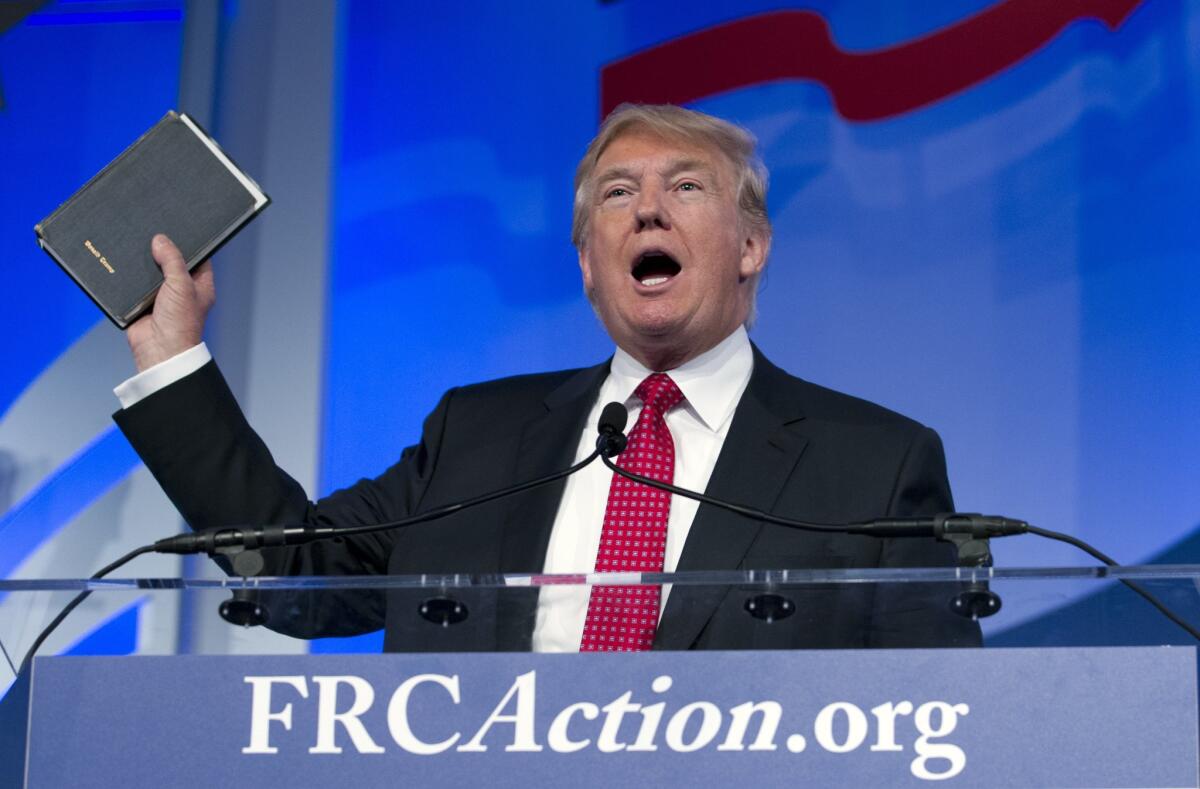
Republican presidential candidate, businessman Donald Trump, holds up his bible who was giving to him by his mother as he speaks during the Values Voter Summit, held by the Family Research Council Action, Friday, Sept. 25, 2015, in Washington ( AP Photo/Jose Luis Magana)
Republican presidential race front-runner Donald Trump didn't seem troubled Friday at the news of House Speaker John A Boehner's resignation. In fact, in a speech critical of the Republican establishment, he said it could be the start of change in Washington.
"We want to see the job being done properly," he told social conservatives gathered in Washington for the annual Values Voters Summit. "We want people that can get it done."
Without naming Boehner, Trump said voters were fed up with politics as usual, especially politicians who made promises, such as repealing Obamacare, that failed to come true. Washington changes outsiders who vow to change it, he charged.
"They come down to these magnificent ballroom ceilings, see all of Washington, and what happens?" he said. "They become different people."
Attendees at the conference, sponsored in part by the Heritage Foundation, the Conservative Political Action Conference and other conservative groups, also seemed pleased at Boehner's resignation. In introducing Trump, David Bossie, president and chairman of Citizens United, drew applause when he proclaimed, "What a great day for America!"
Trump touched on some of his usual campaign themes, including his displeasure with the Iran nuclear deal, a promise to end Obamacare and criticicm of former Florida Gov. Jeb Bush's support for Common Core.
Not all of his comments were welcomed, though. The crowd booed when he said of a fellow candidate, "You have this clown Marco Rubio."
Sensing he'd committed a wrong against Rubio, Trump quickly tried to explain that he didn't like the Florida senator's position on immigration and Rubio's role in an ultimately doomed attempt on Capitol Hill to reform the immigration system.
The hundreds in the audience stopped short of turning on Trump, though. His mention of his Presbyterian faith (he carried a Bible on stage) and promise to unabashedly use the word "Christmas" if elected earned more applause.
Boehner's resignation is fuel for anti-Washington sentiment on the campaign trail
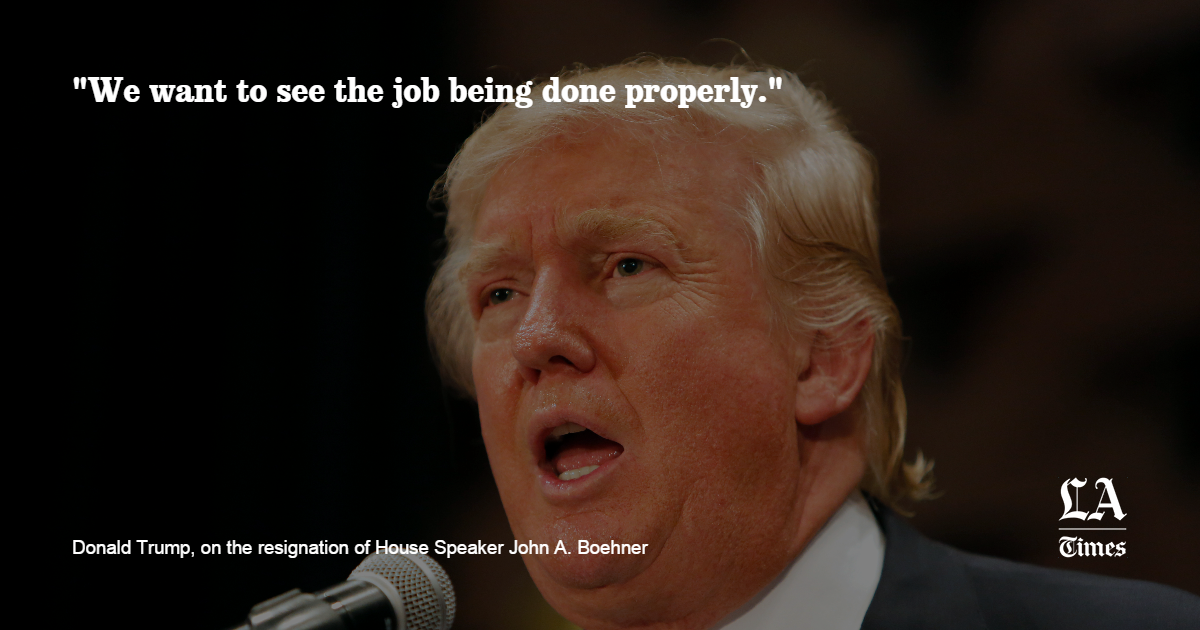
Many of the Republican presidential hopefuls are going before social conservatives at the Value Voters Summit today in Washington, where the crowd is cheering the resignation of House Speaker John A. Boehner, long viewed among the right wing as falling short of conservative principles.
Boehner's resignation exhilarates social conservatives waiting to hear from GOP hopefuls
House Speaker John A. Boehner's planned resignation from Congress, revealed early Friday, was welcome news to the social conservatives gathered in Washington for the annual Value Voters Summit.
Florida Sen. Marco Rubio, who's running for president, announced Boehner's decision at a morning appearance at the event, inspiring a large portion of the audience to stand for a lengthy ovation. Several people whooped and hollered, and one man waved his hat vigorously in the air.
"I'm not here to bash anyone," Rubio said. "But the time has come to turn the page."
Biden to headline gay-rights group's dinner
Vice President Joe Biden will speak to the Human Rights Campaign's annual gathering next weekend, hours after Hillary Clinton addresses the group. Biden's acceptance of the invitation and the juxtaposition of his appearance with Clinton's are sure to spark another round of will-he-won't-he speculation concerning a possible run for the White House, likely to Clinton's chagrin, but the tea leaves on what he'll ultimately decide have proved that they can be arranged to whatever suits your mood.
On education, Carly Fiorina abandons her old positions
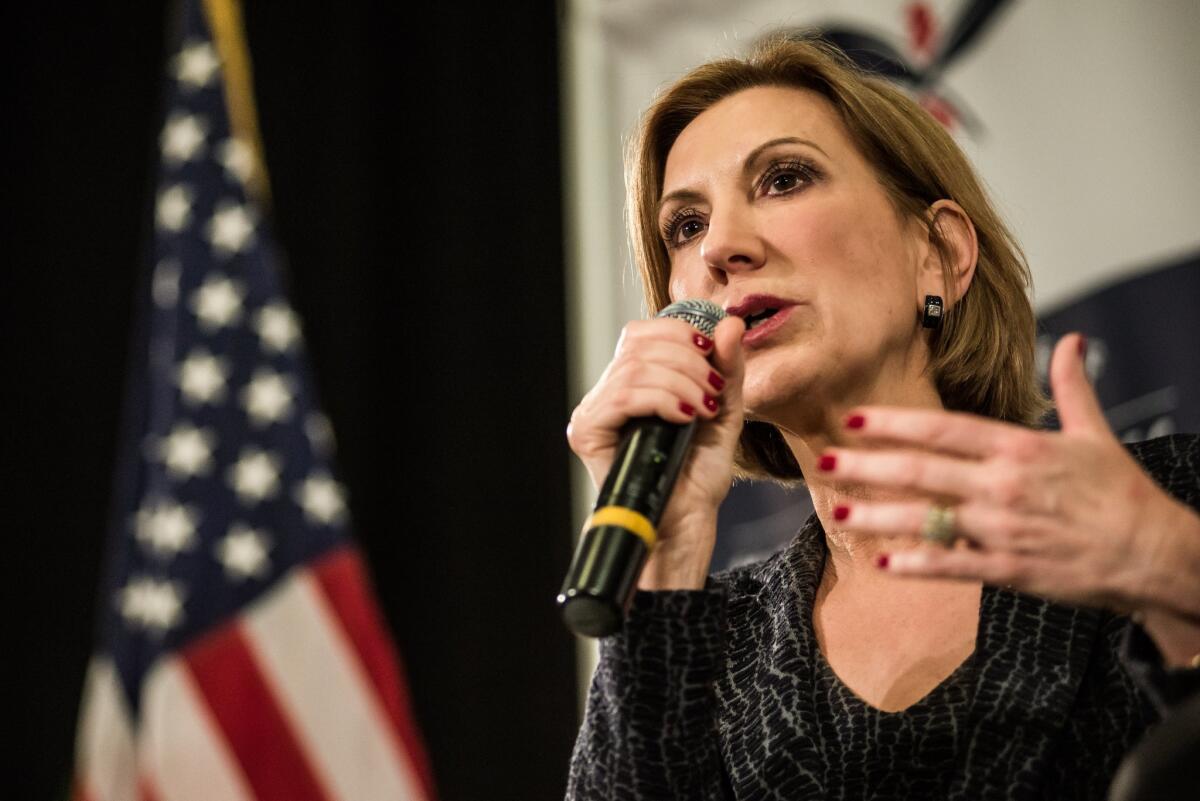
As she rises in the polls, Republican Carly Fiorina’s record has come under closer scrutiny. Some conservative critics have begun questioning the presidential hopeful’s fealty to their principles.
As a master's student at MIT, Carly Fiorina called for a more muscular federal government approach to education -- including greater federal funding and setting curriculum and standards guidelines -- in particular to help minorities, women and the poor.
"Where I had begun as a proponent of 'states' rights' in education, I have ended by believing that we will never meet our own expectations of public education unless the federal government is willing to play a consistent, long-term role; unless education truly becomes a matter of national policy, not just a matter of national rhetoric," Fiorina wrote in 1989 in her 159-page master's thesis.
As a candidate for president in 2016, Fiorina has abandoned that stance. Instead, she has repeatedly railed against federal intervention in education, notably the Common Core standards fiercely opposed by many conservatives.
"No Child Left Behind, Race to the Top, Common Core -- they're all big, bureaucratic programs that are failing our nation," Fiorina said in a radio interview in Las Vegas this month. "Talk about an issue when the professional political class, of both parties, has failed us."
Fiorina's about-face on the federal government's role in education is one of several policy shifts she has made as she mounted her presidential bid.
Her new views are more in line with a passionate segment of GOP voters who believe that the federal government should not have a say in education. In the presidential campaign, their prime target is the Common Core standards that are nonbinding but are viewed by critics as an escalation of federal intrusion.
As recently as 2010, when Fiorina was a Senate candidate in California, she supported federal programs to boost student achievement. Fiorina wrote in a position paper then that President Obama's Race to the Top program "puts into place some critically important accountability measures that Carly believes will help improve our education system."
She also praised President George W. Bush's No Child Left Behind, which she said set higher standards.
Some California donors on edge as Clinton's campaign enters the fall
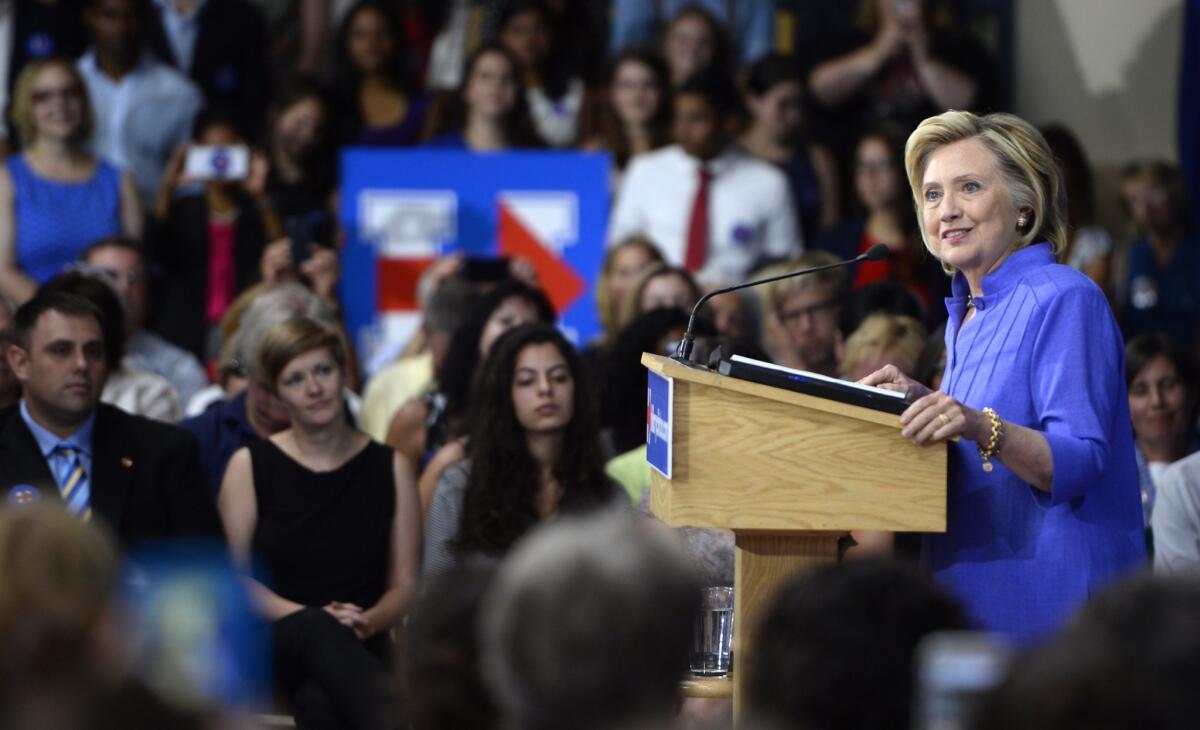
Hillary Rodham Clinton speaks during a town hall meeting in Nashua, N.H., on Aug. 10.
California is known as the ATM of national politics -- especially for Democrats.
But as Hillary Rodham Clinton's campaign enters the fall, how are the state's big-money donors responding to her candidacy?
Clinton's campaign money machine is driven in large part by an extremely fickle -- some might argue self-important -- group of California moguls.
Will it expand?
The Times' Evan Halper and Melanie Mason explore.
By the numbers
Sign up for Essential California
The most important California stories and recommendations in your inbox every morning.
You may occasionally receive promotional content from the Los Angeles Times.







